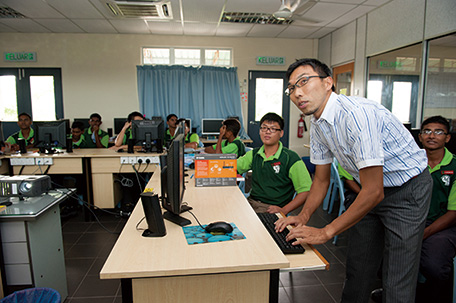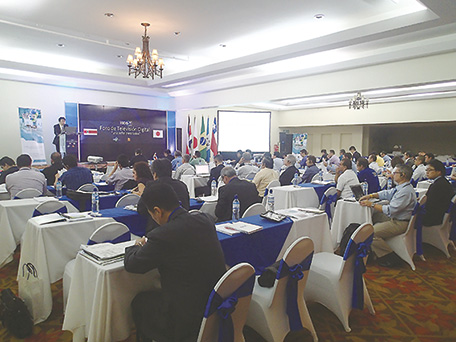(2) Information and Communication Technology (ICT)
The dissemination of Information and Communication Technology (ICT)* contributes to the achievement of sustainable economic growth by upgrading industries and improving productivity. It also contributes to addressing issues related to medical care, education, energy, the environment, disaster risk reduction, and other social issues in developing countries. Utilization of ICT improves their democratic foundation through encouraging information disclosure by the governments, and developing broadcasting media. In this way, ICT is extremely important for strengthening civil society through increased convenience and improved services.
< Japan's Efforts >

A Japan Overseas Cooperation Volunteer, Mr. Takashi Nakayama, teaching the basics of computers and how to connect to the Internet at the Montfort Youth Centre in Malacca, Malaysia. (Photo: Natsuki Yasuda (Studio Aftermode) / JICA)

In September 2014, the first Terrestrial Digital Broadcasting (ISDB-T) Forum in Costa Rica was held after the full-scale broadcasting started in Central America. (Photo: Ministry of Internal Affairs and Communications)
Japan has actively offered assistance mainly for the development of communication and broadcasting equipment and facilities in developing countries, the introduction of the technology and systems they require, and relevant human resources development, in order to help improve the quality of life of all people and to eliminate the ICT disparities that exist between countries and regions.
Specifically, Japan has worked with the International Telecommunication Union (ITU)*, a specialized agency of the United Nations responsible for telecommunications, to provide a variety of development assistance in the field of telecommunications to developing countries. In February 2013, Japan held a workshop and other activities in Tokyo with the aim of spreading e-health, or the use of ICT for health, in developing countries in order to help solve medical problems which are common throughout the world, with the cooperation of domestic ICT companies. At the ITU Plenipotentiary Conference held in Busan, the Republic of Korea, from October to November 2014, a new resolution was adopted regarding the use of ICT for the eradication of the Ebola virus disease. Japan endorsed the resolution and pledged to support ITU's efforts.
In the Asia-Pacific region, the international organization for the information and communication sector referred to as the Asia-Pacific Telecommunity (APT)* has served as a coordinator of regional policy. At the APT Ministerial Meeting in Brunei in September 2014, APT adopted a joint statement for member states and APT to cooperate on building a “smart digital economy” in the Asia-Pacific region. Their efforts have contributed to a balanced development of telecommunication services and information infrastructure within the region. To reduce ICT disparities and solve social issues facing developing countries, including disaster risk reduction and medical care, Japan has supported human resources development such as training in the ICT field and ICT engineer and researcher exchanges through APT.
In June 2014, APT held a workshop in Tokyo on disaster management and communications. Participants shared their know-how and experiences on themes such as the effectiveness and use of emergency communications and warning systems, and exchanged views on future challenges and efforts.
Improved connectivity among ASEAN member states is required for the realization of the ASEAN Community in 2015, and ICT is identified as an important pillar for strengthening this connectivity. With respect to ASEAN, the ASEAN ICT Masterplan was established in January 2011, and in November of that year, the ASEAN Smart Network Initiative and other measures for cooperation enhancement in the field of ICT were incorporated into the joint declaration (Bali Declaration) adopted at the Japan-ASEAN Summit Meeting. Japan supports the development of ICT infrastructure in Myanmar using ODA, and in such ways, extends cooperation in the field of information and communication.
Furthermore, the problems surrounding cyber attacks have led to growing concerns among ASEAN member states as well in recent years. To address these issues, the Japan-ASEAN Ministerial Policy Meeting on Cyber Security Cooperation was held in Tokyo in September 2013.
Japan actively provides comprehensive support for the overseas promotion of Integrated Services Digital Broadcasting-Terrestrial (ISDB-T)* in the areas of maintenance, personnel, and systems, which also contributes to Japan's economic growth. As of May 2014, ISDB-T has been introduced in Latin America and the Caribbean, Asia and Africa, and has been adopted in a total of 16 countries. Japan has dispatched experts to eight countries, including the Philippines, Ecuador and Costa Rica, and has been transferring technologies since FY2009 as part of the support to ISDB-T adopter countries.(Note 9) Furthermore, JICA training is conducted every year for both adopter countries and potential adopter countries to promote the overseas spread and introduction of ISDB-T.
- *Information and Communication Technology (ICT)
- ICT is technology that integrates computers and other information technology with digital communication technology, as characterized by the Internet and mobile phones.
- *International Telecommunication Union (ITU)
- This UN specialized agency is responsible for the fields of telecommunications and broadcasting (HQ: Geneva, Switzerland; 193 member countries). To ensure that people around the world are able to make use of telecommunications technologies, ITU provides support for: (1) the international allocation of radio frequencies used in mobile phones, satellite broadcasting, and other technologies; (2) the international standardization of technologies for telephone and the Internet, etc.; and (3) development in the field of telecommunications in developing countries.
- *Asia-Pacific Telecommunity (APT)
- APT is an international telecommunications organization established in the Asia-Pacific region in 1979, made up of 38 member countries. Aiming for a balanced development of telecommunication services and information infrastructure in the Asia-Pacific region, it develops human resources through training sessions and seminars and coordinates regional policies on standardization, wireless communication, and other telecommunication issues.
- *Integrated Services Digital Broadcasting – Terrestrial (ISDB-T)
- ISDB-T is a terrestrial digital broadcasting system that was developed in Japan. Its functions, such as emergency alert broadcast, TV reception on mobile terminals, and data broadcasting, give the system advantages in disaster response and the realization of diverse services.
- Note 9: The 16 countries are Brazil, Peru, Argentina, Chile, Venezuela, Ecuador, Costa Rica, Paraguay, the Philippines, Bolivia, Uruguay, Maldives, Botswana, Guatemala, Honduras, and Sri Lanka (as of May 2014).
